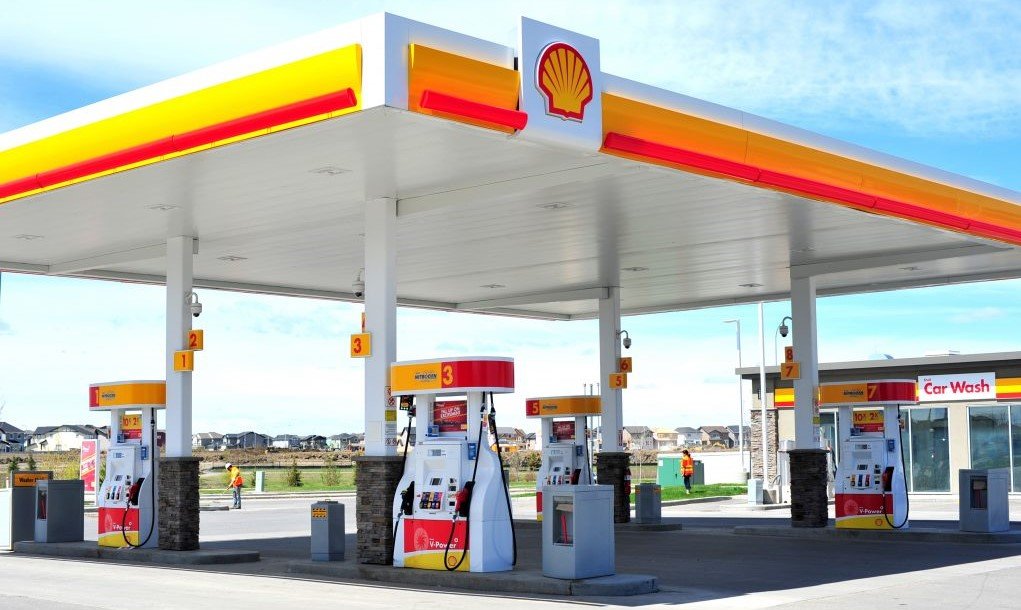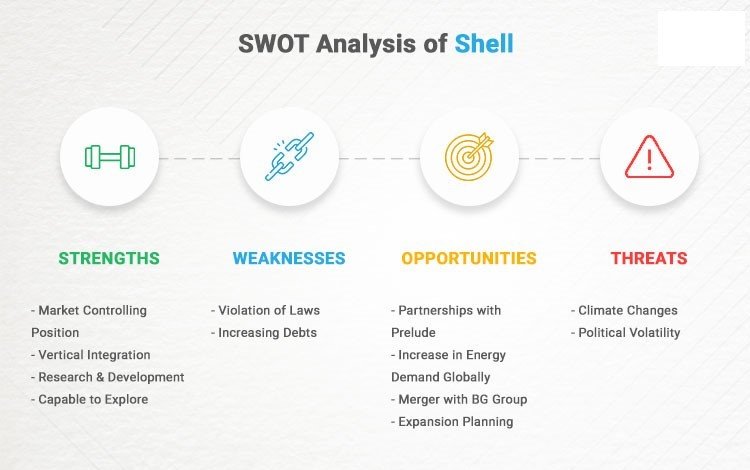Royal Dutch Shell SWOT analysis – SWOT analysis of Royal Dutch Shell: Royal Dutch Shell is a company that offers natural gas and oil located in the Netherlands. With a focus on exploration and exploration of natural gas and oil exploration, the company provides crude oil as well as natural gas across the globe. It manufactures and distributes gasoline and oil within the Integrated Gas, Upstream, and Downstream segments. It also runs businesses that extract natural gas, and crude oil along with natural gas liquids.
The company also invests in gas liquefaction, the transformation of natural gas into liquids, and the manufacturing and marketing of oil, fuels natural gas, and petroleum chemical products as well as logistics of gas and oil; extracting bitumen extracted from mined oil sands and the production artificial crude oils.
The company also offers gasoline, heating oil, diesel as well as aviation fuel, marine gasoline, liquefied natural gas (LNG) for transportation as well as lubricants, bitumen, and sulfur. The company also produces and sells petrochemicals to industrial customers as well.
Royal Dutch Shell fun facts: In 2013, Royal Dutch Shell was the number one company on the ‘Fortune Global 500’ list.
About Royal Dutch Shell – SWOT analysis of Royal Dutch Shell
Contents
- 1 About Royal Dutch Shell – SWOT analysis of Royal Dutch Shell
- 2 Royal Dutch Shell Competitors
- 3 SWOT analysis of Royal Dutch Shell – Royal Dutch Shell SWOT analysis
- 4 Strengths of Royal Dutch Shell – Royal Dutch Shell SWOT analysis
- 5 Weaknesses of Royal Dutch Shell – SWOT Analysis Of Royal Dutch Shell
- 6 Opportunities of Royal Dutch Shell – Royal Dutch Shell SWOT analysis
- 7 Threats of Royal Dutch Shell – SWOT analysis of Royal Dutch Shell
- 8 Overview Template of Royal Dutch Shell SWOT analysis
- 9 Conclusion
[wp-svg-icons icon=”office” wrap=”I”] Company: Shell plc
[wp-svg-icons icon=”user” wrap=”I”] CEO: Ben van Beurden
[wp-svg-icons icon=”user” wrap=”I”] Founder: Hugo Loudon
[wp-svg-icons icon=”calendar” wrap=”I”] Year founded: February 1907
[wp-svg-icons icon=”location-2″ wrap=”I”] Headquarters: London, United Kingdom
[wp-svg-icons icon=”stats” wrap=”I”] Annual Revenue: USD$20.1 billion
[wp-svg-icons icon=”bars” wrap=”i”] Profit | Net income: USD$3.23 billion
[wp-svg-icons icon=”users” wrap=”I”] Number of employees: 87,000
[wp-svg-icons icon=”pie” wrap=”i”] Products & Services: Oils, Fuels, and Car services as well as Exploration, Production, and Refining of Petroleum products
[wp-svg-icons icon=”globe” wrap=”I”] Website: www.shell.com
Royal Dutch Shell Competitors
[wp-svg-icons icon=”pacman” wrap=”I”] Competitors: Imperial Oil Limited | ConocoPhillips Company | Chevron Corporation | Exxon Mobil Corporation | BP p.l.c. | Petronas | Hess Corporation | ADNOC
SWOT analysis of Royal Dutch Shell – Royal Dutch Shell SWOT analysis
SWOT Analysis Of Royal Dutch Shell is brand-based. SWOT Analysis of Royal Dutch Shell evaluates the brand’s strengths, weaknesses, opportunities, and threats. Advantages and disadvantages can be attributed to internal factors while opportunities and threats can be attributed to external factors. We will be discussing Royal Dutch Shell’s SWOT Analysis. Below is the detailed SWOT Analysis of Royal Dutch Shell.
Let’s talk about Royal Dutch Shell’s SWOT assessment.
Strengths of Royal Dutch Shell – Royal Dutch Shell SWOT analysis
- Complete presence in all areas of oil and gas: Royal Dutch Shell is an extensive collection of assets that encompasses every aspect of the oil and gas industry. It includes gasoline, downstream and upstream segments. The company also invests in gas liquefaction; transformation of natural gas into liquids, the manufacturing and marketing of oil, fuel natural gas, and petroleum products; logistics of gas and oil; extraction of bitumen extracted from mined oil sands as well as the manufacturing from chemical crude oils.
- The business plan: Shell, as Royal Dutch Shell is popularly recognized, is a significant player in the field of oil and gas. Its strategy has been to strengthen its strategic position by focusing on the market-leading positions in natural gas, oil, and low-carbon energy, focusing on the future outlook and sustainability.
- Ability to modify: The company started off selling shells, and later it expanded into trading in silk, rice, and machinery. Their first venture into oil and gas began by introducing kerosene. Following that, they moved to natural gas, oil, and later petrochemicals. If you study the background of the company, you will see that its ability to evolve and adjust to its changing needs is one of its strengths.
- Core values: The core values of the company include integrity, honesty as well as respect, and consideration for the people. Each of the strategies employed by the business is based on as well as the codes of conduct and the norms of work and rules of the entire organization are in conformity with these values, which is a key success factor for Shell.
- Solid customer relations: Shell caters to both business customers and drivers. For motorists, they offer various schemes, including loyalty cards and also Shell credit cards that offer value-added services at their fuel stations, and many freebies available to frequent customers. Business customers are treated with respect, and their energy requirements are identified. Shell guarantees that they meet every need, thereby becoming the sole energy supplier to its commercial customers.
Weaknesses of Royal Dutch Shell – SWOT Analysis Of Royal Dutch Shell
- Sustainability issues: Quite like most of their main competitors, Shell is also working to find sustainable solutions for meeting the energy requirements of their clients. Companies like Shell are looking at technological solutions that aim at recuperating more than 30 % of their energy sources for sustainable use in the future. These are expensive options and are reducing the profits of businesses.
- Resources being cut: Shell has been forced to cut its reserves of oil two times in a row. The first time was when the reserve in Nigeria was destroyed as it cut reserve by 3.9bn barrels or one-fifth of its total reserves. The second was in the Ormen Lange gas field in Norway which had reserves of about 150 million barrels.
- Ethical Questions: Shell has faced the majority of ethical disputes, including spills that the company has refused to acknowledge as any responsibility, price battles they regularly wage with competitors, and allegations of unfair prices from customers.
Opportunities of Royal Dutch Shell – Royal Dutch Shell SWOT analysis
- Alternative energy: The firm has a variety of plans for alternative energy alternatives and the company will take all the steps to transition into alternative energy sources which are the future. The company has also invested in sustainable transportation infrastructure, smart cities, and sustainable energy sources.
Threats of Royal Dutch Shell – SWOT analysis of Royal Dutch Shell
- Competitors: The main competitors of Shell are Petronas, British Petroleum, and Chevron.
You May Also Like:
- SWOT analysis of Colgate – Colgate SWOT analysis:
- SWOT Analysis of General Motors – General Motors SWOT Analysis
- SWOT Analysis of Deliveroo – Deliveroo SWOT Analysis
- SWOT Analysis of OLX – OLX SWOT Analysis
- SWOT Analysis of Disney Plus – Disney Plus SWOT Analysis
Overview Template of Royal Dutch Shell SWOT analysis
Conclusion
Royal Dutch Shell Plc has established strong brands recognized globally enhancing its image in the global market. Despite the complexities and risks that are associated with the global operations of the company, there are opportunities for the company to expand and grow its operations in emerging markets. The company can use a differentiation strategy to position its products globally as superior using its brand names. To deal with the risks of globalized operations, it is advisable that the company use strategic partnerships with the local operators in the new markets to enhance its penetration in the markets. Furthermore, the company can establish its competitive advantage by increasing its control over the supply chain through more vertical integration mergers, and acquisitions. Lastly, to increase the efficiency of the company’s operations, there is a need for re-engineering the production process and adopting new efficiency technologies.
This is the SWOT analysis of Royal Dutch Shell. Please let us know if you have additional suggestions to add.
[wp-svg-icons icon=”bubbles” wrap=”i”] Let us know What do you think? Did you find the article interesting?
Write about your experiences and thoughts in the comments below.



